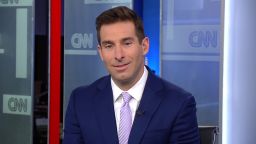Editor’s Note: Elie Honig, a former federal and state prosecutor, is a CNN legal analyst and a Rutgers University scholar. The views expressed in this commentary are his own. View more opinion articles on CNN.
Today’s letter from Attorney General William Barr to Congress summarizing the conclusions of special counsel Robert Mueller is an enormous win, legally and politically, for President Donald Trump. But many political and legal battles of enormous consequence still lie ahead.
Two critical points at the outset. First, Barr’s letter is not the Mueller report; it is a four-page distillation. There is no reason to believe Barr has distorted Mueller’s report, but – as anyone who ever skated through English class using Cliff’s Notes can attest – a summary can be a pale substitute for the real thing.

Second, Barr’s letter appropriately applies the standards of criminal law. That is, Barr employs the familiar “beyond a reasonable doubt” burden of proof necessary to convict a defendant of a crime. Further Congressional action is a separate, and political, question.
As such, Barr delivers a decisive exoneration of Trump and the administration on the question of criminal conspiracy or coordination with Russia. Again, remember: Barr reports that Mueller found insufficient evidence to charge a federal crime, but not necessarily that Mueller found no evidence whatsoever.
The coordination inquiry took place in between two undisputed factual pillars: (1) the Russian state hacked various e-mail accounts associated with Hillary Clinton in an effort to help Trump win the 2016 election, and (2) Trump and his campaign welcomed and encouraged, even in a cheeky fashion, the Russian hacking effort (“if it’s what you say I love it;” “Russia, if you’re listening…”). Trump claimed he was joking. We also know the Trump campaign had dozens of contact with Russians, and that several campaign officials and advisers – Michael Flynn, Michael Cohen, George Papadopoulos – admitted to lying to the FBI or Congress about those contacts.
The question, then, was whether there was enough connective tissue between Russia’s efforts to interfere in the election and the Trump campaign’s desire to benefit from those efforts to support a criminal charge. Barr today delivered a clear answer: no.
The obstruction part of Barr’s letter is more complicated. Barr notes that Mueller “did not draw a conclusion – one way or the other – as to whether the examined conduct constituted obstruction.” Barr also quotes this key line from Mueller’s report: “While this report does not conclude that the President committed a crime, it also does not exonerate him.”
Mueller punted on the obstruction question. While I have the highest possible regard for Mueller as a prosecutor – I’d be happy to be half the prosecutor he is – this was an unusual move. Prosecutors make difficult, and often razor’s edge-close calls about criminal charges all the time. Mueller has been a paragon of decisiveness throughout his career, so this “hard pass” is tough to understand.
Once the ball landed in Barr’s hands, it was easy to tell what he would do on obstruction. Remember: In June 2018 – before Trump chose him as Attorney General – Barr sent an unsolicited, detailed 19-page memo to the Justice Department arguing that Mueller’s “obstruction theory is fatally misconceived.”
Barr previously offered The Hill a more plainspoken assessment, calling the obstruction investigation “asinine.” Barr also wrote, “There is no legal prohibition – as opposed to a political constraint – against the President’s acting on a matter in which he has a personal stake.” Translation: The President is the head of the Executive Branch, the Justice Department is part of the Executive Branch, so the President seemingly can do whatever he wants regarding the Justice Department – even if intended to protect himself.
The focus now shifts to Congress. First, Congress must ascertain whether Barr gave the thumbs-down to obstruction charges because of insufficient evidence or because of his extreme and untested views on presidential authority. Congress also must make an important political calculation: Even if there is not proof of obstruction beyond a reasonable doubt, is there enough for Congress to justify further proceedings?
Other battles lie ahead. House Democrats will fight like mad to get not just Mueller’s report, but also the evidence that underlies it. Leaders of the House also have stated that they intend to subpoena Barr and perhaps Mueller. This means we are likely to see a series of legal and political battles – over the authority of the Legislative Branch to compel testimony from the Executive Branch, grand jury secrecy and executive privilege – each of which carries broad constitutional implications.
Through all of this, Trump still faces many investigations – criminal, civil and legislative. The most potent threat comes from my former office, the Southern District of New York (SDNY), which already has convicted Michael Cohen and reportedly is digging deep on potential campaign finance violations, the Trump Organization and the Trump inaugural committee.
While I do not expect the SDNY to defy existing Justice Department policy and indict a sitting president, the investigations nonetheless could expose criminal wrongdoing by Trump and others in his orbit (the latter group being subject to indictment based on sufficient evidence, of course).
Mueller’s investigation, long seen as an existential threat to Trump’s presidency, will not end with the President in handcuffs. Barr’s letter all but assures that. But many high-stakes showdowns still lie ahead – for the President, Justice Department, Congress and the courts.








